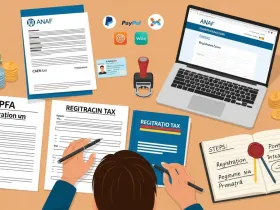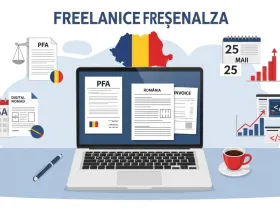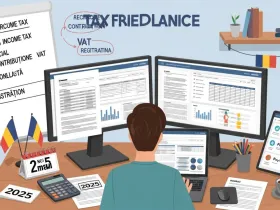So you are considering freelancing in Romania. That’s great news! Whether you’re a digital nomad or planning on staying in Romania for an extended period, it is important to set up your business correctly from the start. As a freelancer, you get to choose between two main business structures, which are PFA (Persoană Fizică Autorizată) and SRL (Societate cu Răspundere Limitată).
Both structures offer opportunities, but come with varying advantages and challenges. When I first started freelancing, I struggled to decide which structure would best suit my needs. It is very easy to get lost in the options. Understanding the difference between PFA and SRL is crucial to making the right decision for your career in Romania.
Let’s discuss it in detail; understanding the comparison PFA vs SRL for freelancers in Romania will provide better clarity on how each structure works, which one fits your needs, and how to implement it.
What is PFA (Persoană Fizică Autorizată)?
The Basics of PFA: A Flexible Approach for Freelancers
Simply put, a Persoană Fizică Autorizată or PFA is a sole proprietorship recognized as the simplest way of operating a business in Romania. The flexibility it offers a freelancer means they do not need to pen down a separate legal entity and incur the costs of constituent documents.
Advantages of PFA:
-
Simplicity: You can achieve an end to unnecessarily long bureaucratic procedures. The time and money spent to obtain documents is marginal.
-
Control: Decisions through regarding the business are entirely in the hands of the PFA.
-
Lower Costs: For most active businesses, there is no need for perpetual administrative burdens or fees to maintain the entity SRL.
The downsides of PFA are just as important to note as the upsides. Alongside the simplicity comes the risk. With a PFA structure put in place, one’s personal assets are vulnerable to any liabilities picked up in the lifetime of the business.
How to Register as a PFA
Becoming a PFA is relatively simple. However, to initiate the process, the first step needed is to determine the desired class of activity along with a CAEN code.
Provide the Office on National Registries of Commerce – Romania (ONRC) with identifying documents (ID, address) and any relevant credentials.
Register with ANAF (Agenția Națională de Administrare Fiscală, Romanian National Tax Agency) for fiscal requirements and select your taxation system (lump-sum income taxation versus actual income taxation).
Although the procedure is straightforward, one fundamental aspect to consider is that the PFA tax structure requires record keeping of all revenues, meaning you will be subject to taxation by your profit after expenses.
What is SRL (Societate cu Răspundere Limitată)?
The Basics of SRL: A Company with Limited Liability
An SRL (also known as Societate cu Răspundere Limitată) is a limited liability company. Unlike a PFA which affects the owner’s personal assets, an SRL separates the owner’s personal assets from a business’s assets, thus providing more protection legally to the owner. An SRL is especially helpful if an owner is planning to scale a business or work with large, formal clients.
Advantages of SRL:
-
Limited Liability: An SRL is often considered more professional than a PFA thus, attracting high paying clients on the go.
-
Professionalism: With an SRL, an owner is free from personal liability of their business, therefore, personal assets are better protected.
-
Scalability: An SRL makes it easier to expand a business, higher new employees, or even bring in outside investors.
Disadvantages of SRL:
-
Higher Costs: Incuring ongoing administrative work like bookkeeping, legal documents, and taxes mean additional expenditures to maintain an SRL compared to a PFA.
-
Complex Administration: Compared to a PFA, accounting and legal work is a more complex bleeding the need for skills and resources.
How to Register an SRL
To set up an SRL, one need to take more steps than registering a PFA:
- Create a company’s statutes and articles of incorporation.
- Srls are registered with the ONRC, accompanied by a founding act, documentation certifying company address, and at least 200 RON in share capital.
- Following this, you must set up a corporate bank account and authorize the deposit of the company’s share capital.
- The next step is registering for tax obligations with ANAF.
PFA vs SRL for Freelancers in Romania: Key Differences
For better understanding of differences between PFA and SRL, we shall categorize them in some key points. The table below should provide a better understanding of the differences according to the selected criteria.
| Aspect | PFA | SRL |
|---|---|---|
| Ease of Setup | Very easy and fast to set up. | More complex and time-consuming setup. |
| Liability | Personal liability for business debts. | Limited liability; personal assets are protected. |
| Taxation | Flat-rate or real income taxation. | Corporate tax and potential additional taxes. |
| Administration | Simple accounting, less paperwork. | Requires professional accounting, more admin work. |
| Cost of Maintenance | Low costs to maintain. | Higher maintenance costs (accounting, legal). |
| Professional Perception | May be perceived as less formal. | Perceived as more professional and stable. |
Which Structure is Best for You? PFA or SRL?
Picking between a PFA (Persoană Fizică Autorizată) and an SRL (Societate cu Răspundere Limitată) is a decision which is dictated by personal business objectives, possibilities for future growth, and the preferred mode of operation. Both have their pros and cons and we will consider them from the perspective of one being more favorable than the other.
When to Choose PFA
When starting out as a freelancer one of the most appealing options in terms of service that is simple and affordable is the PFA structure. Let’s elaborate:
1. Low-Cost and Easy to Manage
Managing tax obligations as a freelancer may not seem as the most appealing of all services. Well, this might be the case if you consider PFA because it is the cheapest and least time consuming when it comes to putting together all the documents required. Most of them will be simple and once they are gathered, everything will be simple and straightforward.
2. Solely Providing Services
If you are a consultant, writer, designer or any type of service provider that does not require employment or other forms of capital expenditure in order to utilize large infrastructure, what you need is PFA. This choice will help you scale with minimal constraints while being very optimal for solo professionals.
3. No Need for Expansion Plans Yet
In the case that you don’t imagine yourself expanding your business, or bringing on new employees in the near term, the simplicity of the PFA will serve you well. Structure allows you to remain streamlined, focusing on what is most important to you, which is serving your clients.
4. Comfortable with Personal Liability
When it comes to PFA, all your business’s liabilities are your responsibility. Though this may for sure seem like a risky avenue, many freelancers find equilibrium only if their business stays small and manageable. For those not caring for personal liability, and just looking to start out under low complexity, PFA can be a great option.
Ideal for Freelancers Who Are:
-
Just starting out
-
Operating as a one-person business
-
Focusing on service-based work
- At ease with personally taking on day to day business risks
When to Choose SRL
If you are planning for growth, then SRL is for you. This choice comes along with more added complexity and more costs associated with it, but adds plenty of pros which will be useful in helping protect the business and facilitate growth.
1. Asset Protection
An advantage of the SRL structure is that it allows limited liability. This implies that if your company incurs legal or financial problems, your personal possessions such as your home or savings are safe. This is particularly beneficial if you intend to expand, make major investments, or take out loans for your business.
2. Scalability
The SRL structure is flexible in terms of growth. If you intend to hire, expand your business operations, or look for funding in the future, an SRL isarrangement will work for all of those plans. It’s more formal and can give you the tools and protections that you require as your business grows.
3. Professional Credibility
Having an SRL will enhance the professional image of your business which may attract bigger clients or partners. Bigger companies might be more willing to do business with SRLs because of the order and formalities it presents. For example, an SRL can issue contracts, formal invoices, and hold meetings which would be harder for a PFA. This enhances the credibility of the business from the eyes of investors, partners or clients who are used to dealing with corporate entities.
4. Tax Flexibility and Benefits
An SRL comes with increased complexity but also offers some tax benefits such as deducting business expenses from gross income, thus increasing taxable income. This business structure gives controlled finances including salaries, dividends, and employee benefits making SRLs easier to deal with.
Ideal for Freelancers Who Are:
- Want to grow their business or bring on new employees.
- Wish to safeguard personal liabilities.
- Wish to obtain high profile clients or business associates.
- Focus on fostering growth in the long run while sustaining the business.
Understanding the Tax Implications: PFA vs SRL
Tax ramifications, for better or worse, influence decisions involving PFA and SRL. Each with its tax benefits, varying between the two can significantly alter potential expenses, as well as complicate dealing with tax filings.
Taxation for PFA
As a PFA, your tax obligations are relatively straightforward, subject to your chosen tax regime.
1. Flat-Rate Income Tax (10%)
Almost all PFAs opt for the most common tax regime involving a flat rate tax of 10% capped at a predetermined income level. This signifies that 10% is levied from your net profit after subtracting any business expenses. Let us take an instance where your revenue stands at 100,000 RON and your business expenses are 30,000 RON. You will be taxed at 10% on the remaining 70,000 RON which would amount to 7,000 RON in taxes.
This kind of taxation is beneficial when your income remains more or less the same and does not change dramatically. Simple, straightforward, manageable.
2. Real Income Taxation
You can also choose income taxation, which allows you to deduct more expenses such as office supplies and travel from your income. This approach, however, is often more intricate because of the required documentation and bookkeeping. Submitting your financial statements to the ANAF (Agenția Națională de Administrare Fiscală) can be a resource draining ordeal.
Social Contributions for PFA
Freelancers and self-employed people have a spending threshold for social security (CAS) and health insurance contributions (CASS). If you surpass this limit, it becomes obligatory.
Taxation for SRL
SRLs have a complicated taxation scheme because of the corporative form, but it also brings certain benefits especially for freelancers planning to scale.
1. Corporate Tax (16%)
An SRL pays 16% corporate tax of the profit (income – expenses) of the company. This tax is applicable to all small and large firms, and remains steady across many sectors. The good part is that with an SRL you can deduct more expenses than with a PFA, which results in lower income of your company.
2. Dividends Tax
Paying taxes on dividends comes into consideration if you decide to extract profits from your SRL. In addition to corporate taxes, there is a 5% tax on your dividends. This is called a tax of convenience and does not apply on PFAs, but could be considered useful as the money removed from the company is not salary, thus exempted from additional payroll taxes.
3. Social Contributions for SRL
Along with other obligations, if an owner of an SRL chooses to pay themselves a salary, they are bound to pay social security (CAS) as well as health insurance contributions (CASS) relative to that salary. This is an obligatory expense and increases the tax liability, but is advantageous for individuals that wish to have a well-defined pension and health insurance scheme.
Final Thoughts: Which Structure Should You Choose?
With PFA and SRL the latter is far more sophisticated. The choice between the two completely depends on your SRL business objectives and your envisioned trajectory. In the case that you are seeking to maximize benefits and looking for a low-cost user friendly exit, PFA is the option. But if you wish to safeguard your valuables, gain access to bigger clientele, or grow the business then SRL could be the better fit.
I suggest considering the advantages and disadvantages in relation to your plans for the future. Hire an accountant if you have any doubts. Professional advice can save you a lot of money in the future.

















Leave a Reply
View Comments